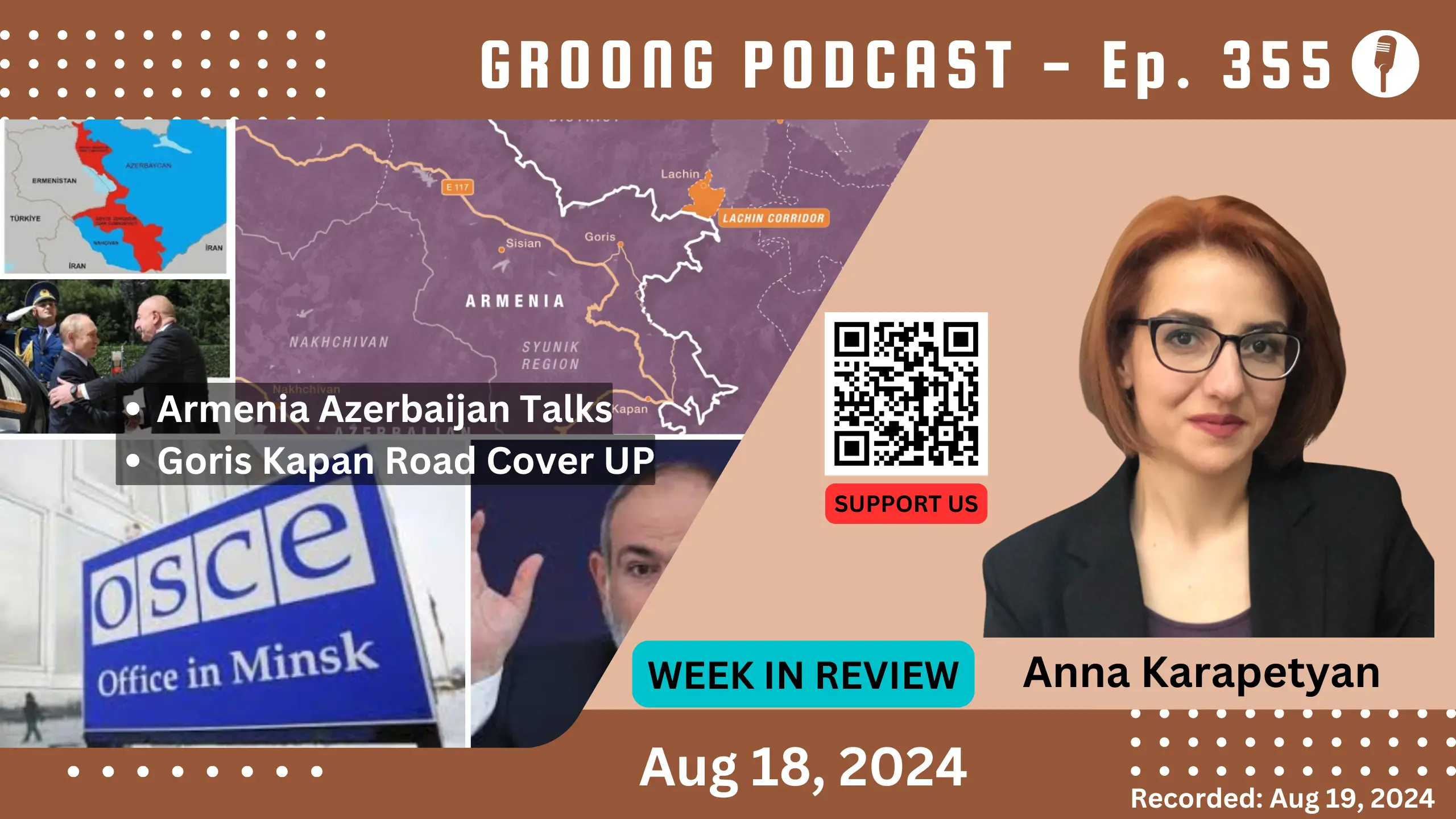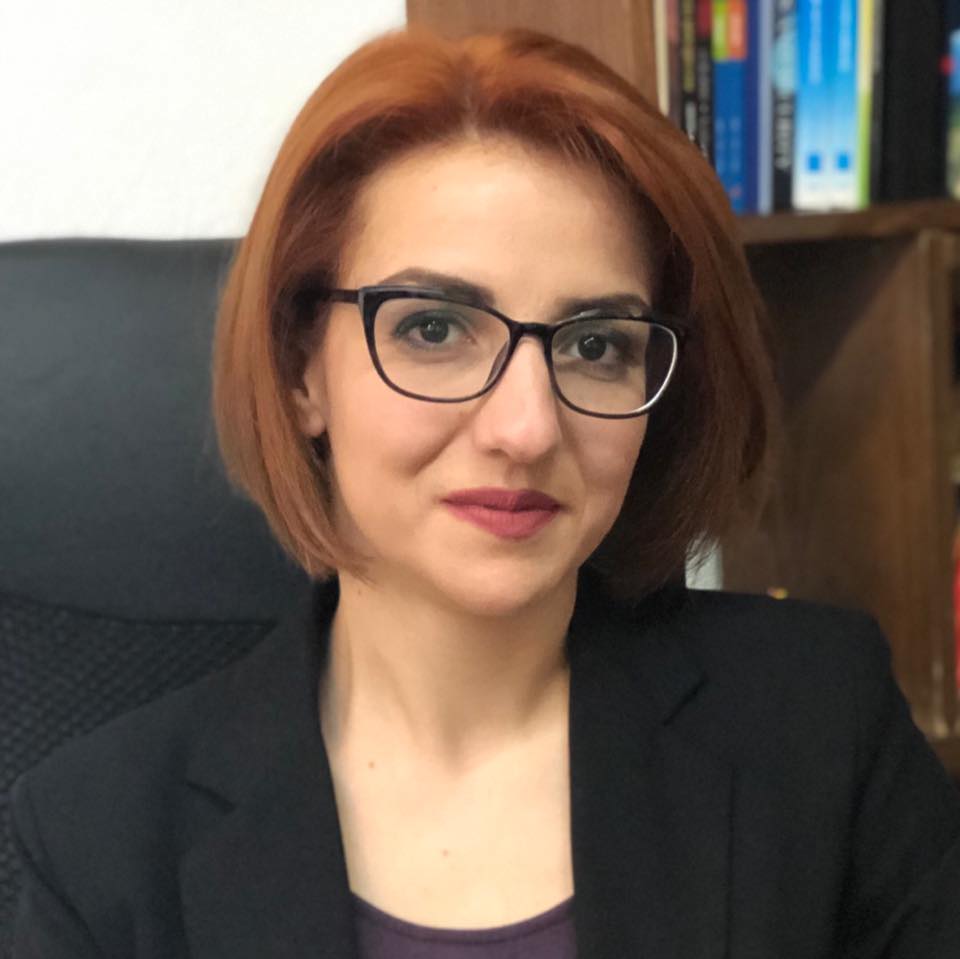Anna Karapetyan - Armenia Azerbaijan Talks, Goris Kapan Road Handover Cover Up | Ep 355 - Aug 18, 2024 [EP355]
Posted on Monday, Aug 19, 2024 | Category: Armenia, Azerbaijan | Series: wir
Groong Links:
Guest:
Topics:
- Armenia Azerbaijan Talks
- Goris Kapan Road Cover UP
Episode 355 | Recorded: August 19, 2024
Show Notes
Armenia-Azerbaijan Talks
Armenia and Azerbaijan participated in a NATO summit in Yerevan at the request of Secretary of State Blinken, but they could not reach any new agreements. Since then Assistant Secretary James O’Brien visited Baku, and to all accounts the US is exerting some pressure on Aliyev to sign an agreement, and soon.
A couple of interesting developments occurred this past week:
- The sides confirmed that the “transport links” provision, this is Baku’s so-called “Zangezur corridor” demand, has been removed from the talks.
- Armenia has linked the issue of applying for the dissolution of the OSCE Minsk Group to the signing of a “peace treaty”.
We should make it clear that there’s not going to be a genuine Peace Treaty any time soon. Whether it’s called a quote-unquote “peace treaty,” or whatever, Baku has made it clear that they will only sign some agreement around principles and that’s it. Everything else about achieving peace is Pashnyan hype, in fact the Azerbaijani side does not call it a “peace treaty”.
Transport Links Removed from Talks
Questions:
- Why was the “Zangezur corridor” discussion removed from the talks?
- Is this a result of US pressure?
- Why is Baku not interested in signing a real peace treaty?
Putin is in Baku for a 2 day visit, yesterday and today.
Question:
- What were the major results?
Azerbaijan is continuing to demand changes to Armenia’s constitution. Pashinyan’s timetable to meet Aliyev’s demands is 2027, meanwhile Armenian parliamentary elections are scheduled for 2026 and this current ruling party and government may or may not continue in power beyond that.
Questions:
- What sort of promises can be made for 2027 if this current government is not re-elected? Can they make such commitments on behalf of a democratically elected future government?
- What scenarios arise under these conditions?
Minsk Group Issue Linked to Peace Treaty
Let’s look at the Minsk Group issue. As we said, Aliyev has demanded that both Armenia and Azerbaijan together apply to the OSCE to dissolve the Minsk Group. Armenia has said that this can be done in the context of signing a peace treaty. Meanwhile the US also indicated they may be open to the dissolution of the Minsk Group by saying that they’re ready to work with the sides in whatever format.
Questions:
- What’s the significance of dissolving the OSCE Minsk Group, which is the internationally agreed-upon platform for the cause of Artsakh? If Aliyev claims that he has solved the Karabakh issue, then why is this still on his agenda?
- Does the Armenian government have the right to surrender the cause of Artsakh?
- Do they mean “peace treaty”, or just any agreement in principle?
“Western Azerbaijani” Tactic
Azerbaijan is officially sponsoring and endorsing the concept of “Western Azerbaijan”. They claim to have lists of hundreds of thousands of people ready to go to Armenia. Meanwhile, no effort like that - and we mean systematic cataloging of hundreds of thousands of Armenian refugees from Baku, Sumgait, and other cities outside of Artsakh - appears to be done on the Armenian side.
It seems like Aliyev has concocted and hyped this propaganda about “the return of Azeris to Western Azerbaijan” essentially as a negotiation topic to help him reject the repatriation of Armenians back to Artsakh. When Armenia doesn’t discuss Artsakhtsi’s return to Nagorno Karabakh the issue goes away. But when their repatriation gains in salience, the Western Azerbaijan story gains momentum.
Questions:
- Why is Aliyev pursuing “Western Azerbaijan” as an official state policy? Is it a negotiation tactic or something else?
- Why not link the “western Azerbaijani” issue to the repatriation of Azerbaijani Armenians back to their homes in Baku and Sumgait?
- Why doesn’t Armenia link the dissolution of the Minsk Group to the repatriation of 150,000 Armenian back to their lands in Artsakh? What is the right negotiation mechanism to get 150,000 Artsakh Armenians back in their homeland?
Azerbaijani Insight on the Talks
An interview from Tofig Zulfugarov, a former Azerbaijani FM, hinted at some of Azerbaijan’s demands:
- “Borders should be determined based on all maps from 1920 until the collapse of the Soviet Union.
- The declaration of Alma Ata is actually perceived by each of the parties in a different way.”
- Do not use the wording “peace agreement”, it is a working name. We are actually dealing with an agreement or declaration of principles.
- The components of the peace agreement are still being developed, of course, some “tracks” are known: at the level of deputy prime ministers.
- There is talk of restoring communications, a border demarcation and demarcation commission has been created
- Another “track” is being formed on humanitarian issues, for example, let’s give up on international courts from mutual claims. This means let’s solve these issues together during the negotiation process.
Questions:
- What does “all the maps from 1920” mean?
- “Let’s give up on International Courts from mutual claims”? When Azerbaijan has no legal leg to stand on in the face of its ethnic cleansing of Artsakh?
Goris-Kapan Road Cover Up
After nearly 4 years of “strategic silence”, the Armenian Ministry of Foreign Affairs officially confirmed that there was a deal behind the back of the Armenian people to hand over the Goris-Kapan road.
Interesting to note that:
- Nikol Pashinyan said that there was a “verbal” understanding, where he contradicted himself, since there exists a signed document that the government of Armenia has officially confirmed.
- Critics claim that this agreement doesn’t mention any legal basis for its existence. It seems to be a completely separate agreement to the Nov 9-10 agreement.
- Ara Ayvazyan, the minister of Foreign Affairs at the time confirmed to Azatutyun that the agreement was kept secret even from him, the top diplomat of the country!
- The Russian language agreement specified that the road was going to be open for transportation, with Armenian soldiers on the “Armenian” portions of it, while the Azerbaijani soldiers on the “Azerbaijani” portions of it. The road today is completely closed.
Questions:
- So why did Pashinyan give this highway to Azerbaijan?
- Why was it done so non-transparently?
A similar issue is festering in the border discussions. The Armenian government is not being communicative, or transparent, or even honest with the Armenian people. We do not know what written or verbal agreements exist.
This past week Azerbaijan accused Armenia of firing from its positions in Tigranashen and Kajaran, towards Azerbaijani outposts. Armenia denied all of the accusations, but the locations are significant. Tigranashen is one of the so-called “enclaves” demanded by Azerbaijan, while Kajaran is an important location in Syunik.
A similar pattern preceded the handover of Kirants, where Azerbaijan made threats and Pashinyan turned it on his own population: “if we don’t give the villages, then by the end of week there’ll be war”.
Questions:
- With trust in this government so low, what are your expectations from these border discussions?
- Do we know the basis for any of the territorial changes? What maps, what legal basis, etc?
Topics from the Panelists
- Anna: An objectified Armenia lonely in the region, afraid of processes around it, unable to respond
- Hovik: Complete lack of government accountability on 2nd anniversary of the Surmalu Blast in Yerevan
Wrap-up
That’s our Week in Review, we hope you found it helpful. We invite your feedback and your suggestions, you can find us on most social media and podcast platforms.
Thanks to Laura Osborn for the music on our podcasts.
Guests

Anna Karapetyan
Dr. Anna Karapetyan is the Director of the Insight Analytical Center for Applied Policy and Research. She has a PhD in political sciences, and is a lecturer at the Russian-Armenian University.
Hosts

Asbed Bedrossian
Asbed Bedrossian is an IT professional, and for years oversaw the central IT enterprise infrastructure and services at USC. His decades of experience spanned across IT strategy, enterprise architecture, infrastructure, cybersecurity, enterprise applications, data center operations, high performance computing, ITSM, ITPM, and more.
Asbed founded the Armenian News Network Groong circa 1989/1990, and co-founded the ANN/Groong podcast in 2020.

Hovik Manucharyan
Hovik Manucharyan is an information security engineer who moved from Seattle to Armenia in 2022. He co-founded the ANN/Groong podcast in 2020 and has been a contributor to Groong News since the late 1990s.
Disclaimer: The views expressed by Hovik Manucharyan on the ANN/Groong podcast are his own and do not necessarily reflect the opinions of his employer or any other organization.